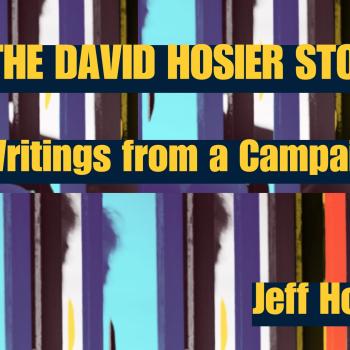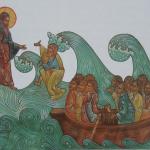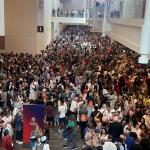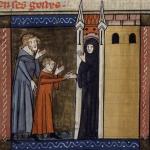With the cardinals assembled in Rome and the papal conclave set to begin tomorrow, my corner of the Catholic world, populated as it is by fellow ecclesial nerds, is all abuzz. The shock waves caused by Benedict’s startling resignation seem to have built up to a sense of nervous excitement as we watch the cardinals themselves attempt to get their bearings for the direction of the Church. With an abundance of speculations but no clear-cut favorite, there is a feel of anticipation in the air, of being at a moment in the life of the global Church where anything could happen.
Following the general buzz, I get a definite sense that the cardinals are feeling the weight of the task ahead of them, with an overwhelming tangle of priorities to balance out. Veteran vaticanista John Allen (who, by the way, has written an impressively analyzed lineup of papabili profiles, each with several points for and against his chances of election) identifies four predominant ones, which he calls the “governance camp” (seeking a pope who can fix the problems in “the internal administration of the church, beginning with the Vatican itself”), the “pastoral camp” (seeking a pope who has “the capacity to heal internal rifts”), the “Third World camp” (seeking a pope “who can put a face on the burgeoning Catholic footprint outside the West”), and the “evangelical camp” (seeking a pope to lead the New Evangelization, with “a slightly more popular touch and a deeply missionary orientation”). While he describes these “camps” in somewhat political terms, Allen takes care to note that “these are not overt blocs with platforms and spokesmen, but more like instincts circulating among cardinals that clash with some visions of the future and overlap with others.” Indeed, his most important point here may be that “the borders among these camps are porous, and many cardinals would identify with more than one.” In that regard, the “camps” that have been forming among the cardinals may be more like broad categories of overlapping concerns.
It seems the ideal pope in many cardinals’ minds would combine pastoral sensibilities, doctrinal soundness, and personal holiness, be a compelling face of the Church to advance the New Evangelization and a bridge figure to broker peace across geographical and ideological divisions, and possess the necessary fortitude to clean house in a Curia badly in need of reform. Finding one among their ranks who combines all of these qualities is undoubtedly a tall order.
The latter concern is perhaps the weightiest, since it lies on a deep fault line in the Church, including within the college of cardinals. Everything I’ve heard about Vatican politics suggests an ongoing, drawn-out battle between the Italians and everyone else. While it would probably be a tad oversimplified to portray this conclave as Italy vs. the world, it does on some level appear to be shaping up to be a showdown between the curial cardinals and all the rest. Some have suggested this is already playing out in the tension between the “Vatican-based cardinals” who “want to get everything over with quickly” and many others who feel the need for more time to become acquainted and discern their priorities.
As the cardinals were still gathering last week, Fr. Anthony Ruff, a liturgical scholar and professor of mine, playfully suggested that the reason the German cardinals were taking their time getting to Rome might have something to do with the “ecclesiological, not to say political aspects behind the decision of when to begin the conclave.” He summarized the above speculation this way:
The word on the street is that the curial cardinals in Rome favor an early start date because this gives them more ability to control the process. The Romans (whatever their nationality) know all the cardinals from around the world (from their visits to headquarters) and so are in the best position to orchestrate campaigns for favored candidates. But a later start date allows the cardinals from Everywhere Else to get to know each other better and take charge of the thing.
In any case, I take immense hope from the strong and consistent impression that the cardinals are taking the whole process very seriously, doing their best to take the time they need to get to know each other, sounding each other out and weighing priorities according to the needs they perceive in their own corners of the world and in the Church universal.
There are still a few factors in the coming conclave that make me nervous. I am nervous about the potentially powerful sway of a curial bloc, and I am nervous about the surprising amount of traction the American cardinals seem to be getting (a curial takeover and a modern-empire papacy being the two most disastrous possible outcomes in my view). But I am heartened by the earnest and prayerful approach that I see reflected, for example, in this Catholic News Service video in which a few cardinals express their own sentiments on what they are about to undertake.
Honduran Cardinal Oscar Rodriguez Maradiaga (starting at 2:12) movingly describes the “big cenacle of prayer” that goes on continuously during a conclave, adding that this is “how an election should be: … in an atmosphere of prayer and not only in political criteria.” Wilfrid Napier, Cardinal Archbishop of Durban, South Africa (starting at 2:41), noting the “excitement” as well as “anxiety” that is present, remarks,
Probably the most solemn, the most difficult [moment], frightening, is when you go with your ballot paper in your hand and hold it up in front of the altar and say, “I call on the Lord Jesus, who will be my judge, to witness that I am voting for the one I believe to be worthy.” That’s really a moment of intense emotion, faith – all these emotions come together at that point. If I’m voting for unworthy reasons, I’m actually asking Jesus to judge me, condemn me in other words. So it’s a very, very solemn moment.
Clearly, the college of cardinals is collectively feeling the solemnity of the occasion as they prepare to begin the conclave. Let us pray along with them: Veni, Sancte Spiritus.
















